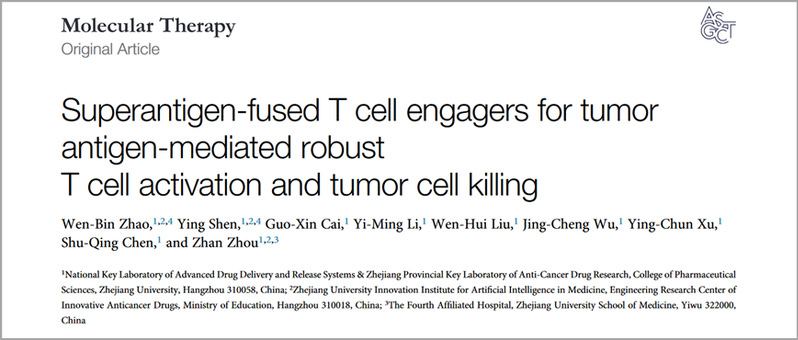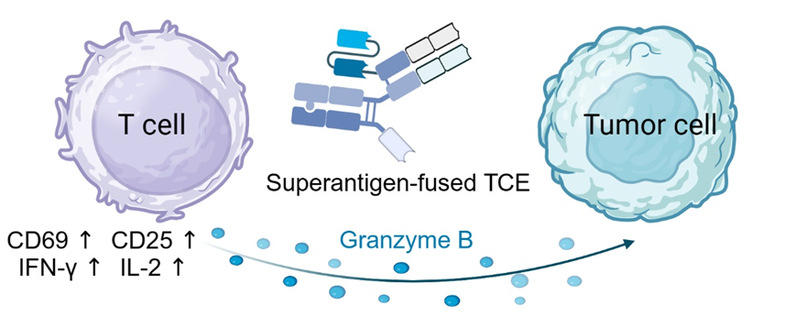ZJU research team improves the efficacy of TCE in solid tumors by fusing superantigens
2024-02-26 | 药学院英文网
T cell engager (TCE) is a type of bispecific antibody capable of binding tumer antigens and T cell CD3ε antigens simultaneously and recruiting T cells to kill tumor cells specifically, which demonstrates well clinical results in some hematologic tumors. The core effective cell of TCE to bring out its activity is the T cell, whose activity is deemed as the most desicive factor of TCE's healing effect. However, the complex and variable microenvironment in solid tumors leads to severe suppression of T cell function, resulting in difficulty for TCE to activate T cells effectively, which refrains the efficacy of TCE therapy in solid tumors greatly. That's why it is one of the most important way to improve the efficacy of TCE to keep the specificity of TCE for tumors and reinforce its ability to activate T cells, yet the appraoch lacks effective strategy in clinical practice now.
Addressing the issue, CPS-ZJU and Smart Innovative Drug Reseach Institution team propose a new idea of synergistic potency of potent immune activators (superantigens) and TCE, and design a new kind of SEA-superantigen-fused TCE, which provides potential strategy to improve the efficacy of TCE. The research was published lately on Molecular Therapy, titled "Superantigen-fused T cell engagers for tumor antigen-mediated robust T cell activation and tumor cell killing".

The team takes advantage of the feature of SEA to stimulate T cell activation and multiplication effectively, designing SEA-fused TCE, which shows stronger tumor-killing activity than other control molecules after being co-incubated with antigen-positive tumor cells and peripheral blood mononuclear cells (PBMCs), with its activity relying on the expression of tumor antigen. Futher research indicates that SEA-fused TCE can promote the expression of T cell surface activation markers (CD69 and CD25) remarkably, thereby stimulating the proliferation and IFN-γ, IL-2, granzyme B and various cytokine secretion of T cell to kill positive tumor cells, which draws anttention that the improvement of the anti-tumor specific activity of SEA-fused TCE stems mostly from the effective activation and proliferation of antigen-relying T cells.

In order to probe into the machine of SEA reinforcing TCE activity deeply, the team analyzes the genetic expression change of SEA-fused TCE or normal TCE after being co-incubation with PBMCs, and finds out that SEA-fused TCE raises the expression of T cell activation relative genes such as CD69, CE25, granzyme B and at the same time, lowers the expression of immune checkpoint genes like VSIG4 remarkably. Besides, there are evident differences between SEA-fused TCE group and normal TCE group in terms of chemotaxis, indicating the potential ability to reinforce T cell infiltration of SEA-fused TCE.
What's more, with multiple tumor-loading mice models, the team also shows that SEA-fused TCE group has better tumor-suppression effects and higher surviving rate than the control group, in which human-based-CD3ε-modificated mice model shows that the cytokine storm of SEA-fused TCE is not intense, indicating that SEA-fused TCE has relatively better anti-tumor activity and well safety in human body.
More information: Wenbin Zhao and Ying Shen, both doctors of CPS-ZJU and Smart Innovative Drug Reseaech institution are the first authors, Professor Shuqing Chen and Associate Professor Zhan Zhou are the corresponding authors.
Translator: Zihao Liu
Editor: Yichen Zhu
NEWS
-
10
2025.12
-
27
2025.11
-
25
2025.11
-
03
2025.11
-
30
2025.10
-
29
2025.10
